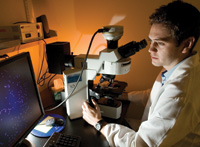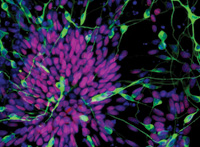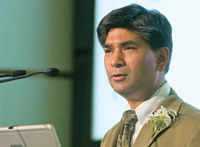Highlights | Research
Enhancing Relationships with Industry
 An enhanced culture of innovation and
collaboration on the U-M campus will allow research knowledge to be applied
to major societal needs, spur regional economic development and new jobs, give
students valuable learning experiences, and help the University procure resources
and expertise. However, changes in the global economy require that U-M broaden
its already strong connections with industry in order to build a better future,
according to two campus committees that recently analyzed University-industry
partnerships at the request of Stephen Forrest, vice president for research.
An enhanced culture of innovation and
collaboration on the U-M campus will allow research knowledge to be applied
to major societal needs, spur regional economic development and new jobs, give
students valuable learning experiences, and help the University procure resources
and expertise. However, changes in the global economy require that U-M broaden
its already strong connections with industry in order to build a better future,
according to two campus committees that recently analyzed University-industry
partnerships at the request of Stephen Forrest, vice president for research.
The committees—one comprised of faculty and the second of administrators—were asked to develop steps the University can take in order to rejuvenate and strengthen its connections with industry. The plans include many suggestions, from ways to make industry engagement a visible and central element of University life to improving coordination across the campus of these kinds of partnerships. The committees presented ideas to encourage faculty to engage in entrepreneurial activities and new companies, and to revise research policies to make industry-sponsored projects more appealing and efficient for faculty. And, importantly, the report recommended that the entire campus must become more cognizant of the time pressures facing industry and act accordingly in setting up relationships.
The report also called for the creation of a business engagement center that would serve as a central and highly visible point of focus for existing and new relationships between campus units and industry partners. By coordinating the U-M’s industry relationships from a single physical location, the University can leverage its efforts to raise awareness among potential partners, provide a simpler means of access to campus research and faculty expertise, and work more efficiently with regional and state economic development efforts.
MSU, U-M, Wayne State Create University Research Corridor
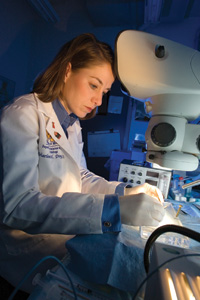 In November 2006, Michigan State University, the University of Michigan, and
Wayne State University announced the creation of the University Research Corridor
(URC), an ongoing alliance that will work to transform, strengthen, and diversify
the state’s economy.
In November 2006, Michigan State University, the University of Michigan, and
Wayne State University announced the creation of the University Research Corridor
(URC), an ongoing alliance that will work to transform, strengthen, and diversify
the state’s economy.
Research Corridor universities are a magnet for investment and jobs, and bring more than $1.3 billion in external research grants into Michigan each year. By marshalling their resources, the presidents of the three universities are reaching out to businesses, policymakers, innovators, investors, and the public to speed up technology transfer, make resources more accessible, and help attract new jobs to the state.
Over the past five years, the universities—which together bring 95 percent of federal academic research dollars to Michigan—have announced an average of one invention every day. Collectively these discoveries have led to more than 500 license agreements for new technologies and systems.
URC partners work in collaboration on many projects, both among themselves and with business communities, ranging from technology transfer and commercialization to entrepreneurship and urban policy. Michigan’s resulting “brain gain” is a prime example of research as a magnet for economic development.
“We have an absolute responsibility to the state to help transform an economy that is flagging,” said U-M President Mary Sue Coleman. “Together we have achieved much. But we must set our sights higher and do even more to turn ideas into action.”
Research Expenditures Reach $823 Million
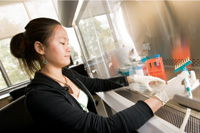 U-M spent $823 million on research activities in fiscal 2007. The most recent
National Science Foundation (NSF) survey, which is based on FY 2005 data, places
U-M second in the nation for total research expenditures. Only Johns Hopkins
University, which has a federal lab associated with it, leads U-M.
U-M spent $823 million on research activities in fiscal 2007. The most recent
National Science Foundation (NSF) survey, which is based on FY 2005 data, places
U-M second in the nation for total research expenditures. Only Johns Hopkins
University, which has a federal lab associated with it, leads U-M.
Research activities at the University make a huge difference in the quality of life and economic progress for people in the state of Michigan and beyond. The development and application of new technologies will play an increasingly pivotal role in the formation of new industries and markets, and in the creation of high-paying jobs.
As the most exciting breakthroughs will increasingly occur at the intersections of disciplines, future discoveries will likely depend on some combination of biology, nanotechnology, information science, physical science, medicine, and engineering. U-M’s enthusiastic embrace of a multidisciplinary approach to both education and research means that it will continue to be a valuable resource to both the state and the nation as a leader of learning, discovery, and innovation.

U-M Launches Michigan Memorial Phoenix Energy Institute
 In September 2006, U-M announced a significant expansion of its efforts in
energy research with the creation of the Michigan Memorial Phoenix Energy Institute
(MMPEI). The Institute will coordinate activities; serve as an international
authority and resource in energy-related issues; assist in developing funding
sources and attracting faculty; manage the facilities; engage industry; and
provide a unified voice and focal point on energy research, policy, and education.
In September 2006, U-M announced a significant expansion of its efforts in
energy research with the creation of the Michigan Memorial Phoenix Energy Institute
(MMPEI). The Institute will coordinate activities; serve as an international
authority and resource in energy-related issues; assist in developing funding
sources and attracting faculty; manage the facilities; engage industry; and
provide a unified voice and focal point on energy research, policy, and education.
The University is launching MMPEI with $9 million and plans to recruit top-tier energy research faculty. Additional funds from the College of Engineering (CoE); Literature, Science, and the Arts (LSA); and most recently, the DTE Energy Foundation, will help establish several new, chaired faculty positions. Graduate fellowships in energy research will be created in partnership with the Rackham Graduate School. The new Institute will be housed in the Michigan Memorial Phoenix Laboratory, now under renovation with $11 million in state capital outlay and U-M funding.
Under the leadership of CoE faculty member Gary S. Was, MMPEI will coordinate existing energy research that is distributed across campus in a variety of disciplines and locations. The lab will provide resources and a common space for faculty pursuing energy-related research. The third floor of the Phoenix Laboratory will house the Hydrogen Energy Technology Lab, led by Professor Levi Thompson.


